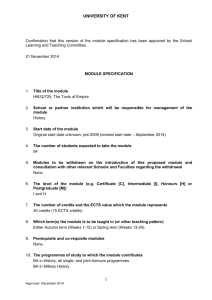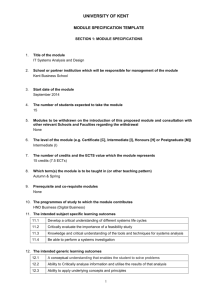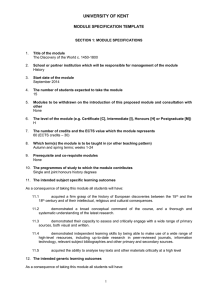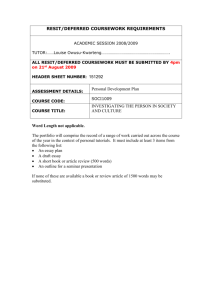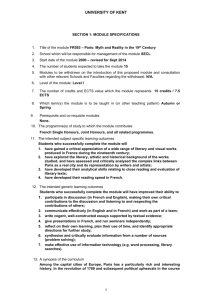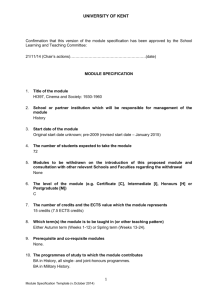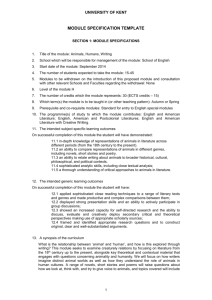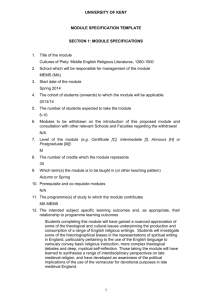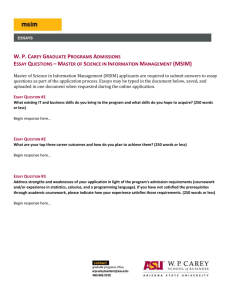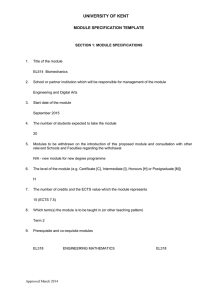Where the module is proposed by a Partner College/Validated
advertisement
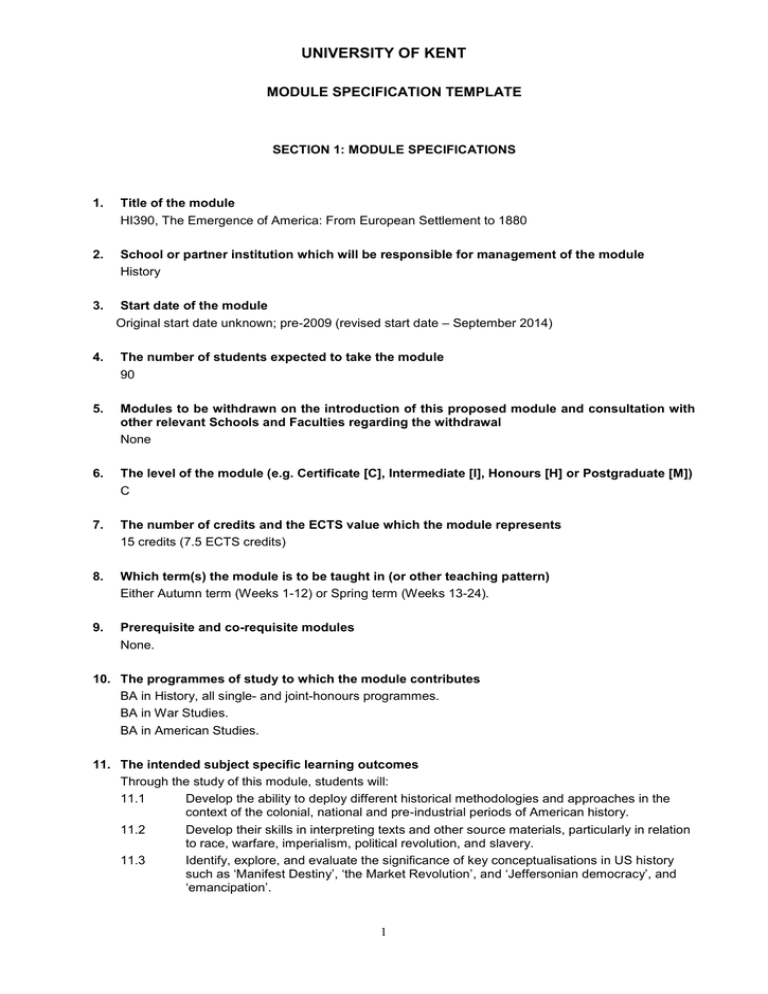
UNIVERSITY OF KENT MODULE SPECIFICATION TEMPLATE SECTION 1: MODULE SPECIFICATIONS 1. Title of the module HI390, The Emergence of America: From European Settlement to 1880 2. School or partner institution which will be responsible for management of the module History 3. Start date of the module Original start date unknown; pre-2009 (revised start date – September 2014) 4. The number of students expected to take the module 90 5. Modules to be withdrawn on the introduction of this proposed module and consultation with other relevant Schools and Faculties regarding the withdrawal None 6. The level of the module (e.g. Certificate [C], Intermediate [I], Honours [H] or Postgraduate [M]) C 7. The number of credits and the ECTS value which the module represents 15 credits (7.5 ECTS credits) 8. Which term(s) the module is to be taught in (or other teaching pattern) Either Autumn term (Weeks 1-12) or Spring term (Weeks 13-24). 9. Prerequisite and co-requisite modules None. 10. The programmes of study to which the module contributes BA in History, all single- and joint-honours programmes. BA in War Studies. BA in American Studies. 11. The intended subject specific learning outcomes Through the study of this module, students will: 11.1 Develop the ability to deploy different historical methodologies and approaches in the context of the colonial, national and pre-industrial periods of American history. 11.2 Develop their skills in interpreting texts and other source materials, particularly in relation to race, warfare, imperialism, political revolution, and slavery. 11.3 Identify, explore, and evaluate the significance of key conceptualisations in US history such as ‘Manifest Destiny’, ‘the Market Revolution’, and ‘Jeffersonian democracy’, and ‘emancipation’. 1 UNIVERSITY OF KENT 11.4 Develop their essay writing and oral presentation skills and learn how to make good use of the relevant library resources and to illustrate their argument using a range of primary sources in US history. 12. The intended generic learning outcomes Through the study of this module, students will: 12.1 Be encouraged to consider critically relevant intellectual concepts as well as differences of opinion and interpretation both amongst historians, and they will also be encouraged to develop their ability to identify and solve problems 12.2 Be required to work both independently and within groups. Students will engage in independent work, using library resources, and will practice and improve their skills in time management, historical research, organisation and analysis of material, oral presentations and essay-writing. 12.3 Engage in group work, in which they will be encouraged to interact effectively with others and to work co-operatively to enhance one another’s learning. 12.4 Acquire the skill to communicate complex concepts effectively through written work. They will acquire the ability to further develop skills they have already gained, which will be of use to them in future study or occupations. 12.5 Improve their communication skills and skills with IT. 12.6 Acquire the skill to present information creatively and accessibly. 13. A synopsis of the curriculum The module will focus primarily on the period from the 18th century onwards but will begin with an outline treatment of the British colonies in North America from initial European settlement. Interactions between Native American, African, African-American and European populations will be emphasised in the colonial period. Thereafter the module examines the first anti-colonial revolution in modern history and the creation of a new nation and concludes with the reconstitution of the nation after a bloody civil war and on the eve of large-scale industrialisation. Themes include the causes and consequences of the Revolution, the new political system, the development of mass democracy, economic development and territorial expansion into the West, reform movements, sectional conflict between North and South, slavery, the Civil War and the reestablishment of a national order during Reconstruction. 14. Indicative Reading List COUNTRYMAN, E. (1986) The Americans. New York. Farrar. GRANT & HOLDEN REID (eds.) (2000). The American Civil War: Explorations and Reconsiderations. London. Longman. HOFFMAN & GJERDE (eds.) (2011) Major Problems in American History. Vol. I. Boston. Wadsworth. JONES, M. (1998) The Limits of Liberty. Oxford. Oxford University Press. KOLCHIN, P. (1995) American Slavery, 1619-1877. London. Penguin. NOBLES, G. (1998) American Frontiers. New York. Hill and Wang. 15. Learning and Teaching Methods, including the nature and number of contact hours and the total study hours which will be expected of students, and how these relate to achievement of the intended module learning outcomes Contact hours: 10 lectures and 10 seminars. There will be one writing week and one week devoted to individual essay return. 20 hours in total. [LOs 11.1-5; 12.1, 12.3-6] Study hours: 11 hours per week 152 hours in total. 2 UNIVERSITY OF KENT 16. Assessment methods and how these relate to testing achievement of the intended module learning outcomes If the module runs in the Autumn term, the module will be assessed by 100% coursework. Two essays (2000 words each – each essay is worth 40% of the overall module mark). Through the essay, students learn to research a subject and to formulate and present their own opinions. [LOs 11.1-4; 12.1-2, 12.4-6] Participation in seminars (20% of the overall mark). The criteria used to mark seminar participation will be based on students’ level of engagement with the seminar readings and with one another’s responses and opinions displayed in seminars. [LOs 11.1-4; 12.3-4, 12.6] If the module runs in the Spring term, the module will be assessed by 50% coursework and 50% examination. The coursework element will include: Two essays (1500 words each – each worth 40% of the overall coursework mark). Through the essay, students learn to research a subject and to formulate and present their own opinions. [LOs 11.1-4; 12.1-2, 12.4-6] Participation in seminars (20% of the overall coursework mark). The criteria used to mark seminar participation will be based on students’ level of engagement with the seminar readings and with one another’s responses and opinions displayed in seminars. [LOs 11.1-4; 12.3-4, 12.6] The examination will be taken during the Summer term, and will take the form of one 2-hour paper, during which students will answer two essay-style questions selected from a list of between eight and twelve questions. Careful attention will be given to the construction of questions to ensure that no overlap between coursework essay questions and examination questions occurs. 17. Implications for learning resources, including staff, library, IT and space The Templeman library already contains a good set of resources on the topics, but over time this will need to be supplanted by recently published work . 18. The School recognises and has embedded the expectations of current disability equality legislation, and supports students with a declared disability or special educational need in its teaching. Within this module we will make reasonable adjustments wherever necessary, including additional or substitute materials, teaching modes or assessment methods for students who have declared and discussed their learning support needs. Arrangements for students with declared disabilities will be made on an individual basis, in consultation with the University’s disability/dyslexia support service, and specialist support will be provided where needed. 19. Campus(es) where module will be delivered: Canterbury If the module is part of a programme in a Partner College or Validated Institution, please complete the following: 20. Partner College/Validated Institution: 21. University School responsible for the programme: 3 UNIVERSITY OF KENT SECTION 2: MODULE IS PART OF A PROGRAMME OF STUDY IN A UNIVERSITY SCHOOL Statement by the School Director of Learning and Teaching/School Director of Graduate Studies (as appropriate): "I confirm I have been consulted on the above module proposal and have given advice on the correct procedures and required content of module proposals" ................................................................ .............................................. Director of Learning and Teaching/Director of Graduate Studies (delete as applicable) Date ………………………………………………… Print Name Statement by the Head of School: "I confirm that the School has approved the introduction of the module and, where the module is proposed by School staff, will be responsible for its resourcing" ................................................................. .............................................. Head of School Date ……………………………………………………. Print Name SECTION 3: MODULE IS PART OF A PROGRAMME IN A PARTNER COLLEGE OR VALIDATED INSTITUTION (Where the module is proposed by a Partner College/Validated Institution) Statement by the Nominated Officer of the College/Validated Institution (delete as applicable): "I confirm that the College/Validated Institution (delete as applicable) has approved the introduction of the module and will be responsible for its resourcing" ................................................................. .............................................. Nominated Responsible Officer of Partner College/Validated Institution Date …………………………………………………. Print Name ………………………………………………….. Post …………………………………………. Partner College/Validated Institution Module Specification Template Last updated February 2013 4
